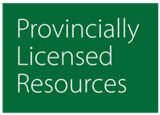
Full digital replica of local, national and international newspapers and magazines.
- Subject:
- Communication Media
- English Language Arts
- Social Studies
- Material Type:
- Homework/Assignment
- Author:
- Regan Gunningham
- Elgin Bunston
- Date Added:
- 07/08/2024

Critical Thinking

Full digital replica of local, national and international newspapers and magazines.

From The University of Waterloo:
"Many instructors in engineering, math and science have students solve “problems”. But are their students solving true problems or mere exercises? The former stresses critical thinking and decision-making skills whereas the latter requires only the application of previously learned procedures. True problem solving is the process of applying a method – not known in advance – to a problem that is subject to a specific set of conditions and that the problem solver has not seen before, in order to obtain a satisfactory solution."
Details are provided on the principles of problem-solving as well as each step of the process outlined below:
Define the Problem
Think About it
Plan a Solution
Carry Out the Plan
Look Back
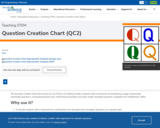
What is a Question Creation Chart (QC2)?
The Question Creation Chart (also known as a Q-Chart or Q-Matrix) provides students with a framework for developing a range of personally meaningful questions, encompassing both close-ended factual questions and open-ended, divergent questions. (Adapted from Weiderhold, 1997).
Why use it?
To provide students with a framework for creating their own divergent and convergent questions on a specific topic.
To encourage students to think deeply about a topic.
To help students strengthen their understanding and comprehension of a topic.
To stimulate students’ prior knowledge about a topic.
To collect information about students’ knowledge and understanding of a topic.
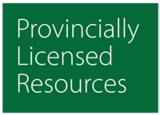
REVEL (Ressources éducatives vidéos en ligne) est le service de lecture vidéo en transit offert aux enseignants et élèves de la Saskatchewan, de la prématernelle jusqu’à la 12e année. C’est le ministère de l’Éducation qui en assure la gestion et l’entretien.
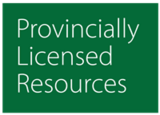
ROVER (Recommended Online Video Education Resources) is the video streaming site for Saskatchewan teachers and students in the PreK-12 education system. It is managed and maintained by the Saskatchewan Ministry of Education.
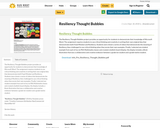
The Resiliency Thought Bubbles project provides an opportunity for students to
demonstrate their knowledge of Microsoft Word. The assignment requires students to
use critical thinking and creativity in writing their own original idea that demonstrates
both Fixed Mindset and Resiliency. Students were shown a series of videos that
demonstrate the meaning of Resiliency then challenged to use critical thinking when
they wrote their own examples. Finally, I selected one student example from each of my
six PAA Multimedia classes and created a bulletin board display; the display includes a
Brain illustration that was a collaborative and creative endeavor between a grade ten
student and a grade twelve student.
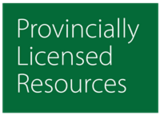
Safetycare streaming videos help organizations protect their most valuable asset; its people. Safetycare produces engaging English and French workplace safety training video content that is used and viewed by organizations around the world.
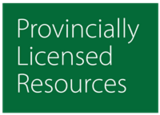
Science Online offers a comprehensive overview of a broad range of scientific disciplines. This resource includes eLearning modules, teacher support materials, diagrams, interactive science experiments and more.This resource is primarily designed for high school students but there is some content appropriate for Grade 6 - Grade 8 students.
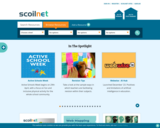
This website is excellent. It contains rich and diverse high-quality resources directed towards teachers and learners. Activities and guides can be self-paced/self-directed by the learner, or facilitated with adults. Material encourages critical thinking, and learning across subjects (ex: integrating learning new vocabulary into math activities).
Resources available across subjects, searchable by grade level, subject, and domain within each subject (ex: fractions within mathematics).
Materials for early childhood and grades K-12. Freely available.

ScratchJr is an app that is available through Apple (https://apps.apple.com/us/app/id895485086?ign-mpt=uo%3D4) or Google Play (https://play.google.com/store/apps/details?id=org.scratchjr.android).
With ScratchJr, young children (ages 5-7) learn important new skills as they program their own interactive stories and games.
By snapping together graphical programming blocks, children can make characters move, jump, dance, and sing. In the process, children learn to solve problems, design projects, and express themselves creatively on the computer. They also use math and language in a meaningful and motivating context, supporting the development of early-childhood numeracy and literacy. With ScratchJr, children don’t just learn to code, they code to learn.
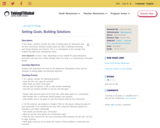
In this lesson, students consider the value of setting goals for themselves and for their community, thinking critically about the idea of defining community and shared interests and concerns. This is an introduction to the concepts that underlie the Millennium Development Goals.
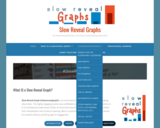
Slow Reveal Graph (#slowrevealgraph) is an instructional routine that promotes sensemaking about data. This highly engaging routine uses scaffolded visuals and discourse to help students (in K-12 and beyond) make sense of data. As more and more of the graph is revealed, students refine their interpretation and construct meaning, often in surprising ways. This routine increases access for students without sacrificing rigor or engagement.
You will find all types of graphs for all ages of learners from elementary to high school.
Here are the steps:
- It starts with a graph that has been stripped of context: its numbers, its labels, its title.
- The teacher facilitates a discussion around what students notice and wonder. (The slides give discussion suggestions)
- Then another slide is revealed.
- Students identify what information is new.
- Then another slide is revealed.
- Again, students identify what information is new (the title) and discuss how this changes their understanding of the graph.
- As more slides are added, more insight into this data representation is revealed.
The introductory page for the graph also offers more information about the context for this graph, other content connections, and paired texts for students to explore.
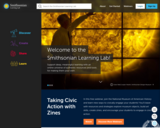
The Smithsonian Learning Lab puts the treasures of the world's largest museum, education, and research complex within reach. The Lab is a free, interactive platform for discovering millions of authentic digital resources, creating content with online tools, and sharing in the Smithsonian's expansive community of knowledge and learning.
Use the search tool to discover lots of resources on endless topics. The sky's the limit!
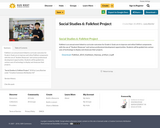
Folkfest is an annual event linked to curricular outcomes for Grade 6. Goals are to improve and refine Folkfest components with the use of “Student Showcase” and various professional development opportunities. Students will be guided into various uses of technology to display and showcase their projects.
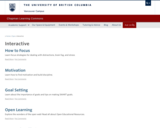
This is a series of toolkits for older students.
The toolkits allow students to explore a topic, watch videos on the content, and apply what they learn.
Topics include:
Interacting with profs, library skills, managing your time, preparing for exams, presentation skills, reading textbooks, taking notes, thinking critically, working in groups, and writing.
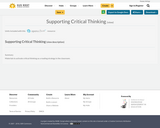
Materials to activate critical thinking as a reading strategy in the classroom.

In building birdhouses, students needed to think critically and problem solve how they were to construct them. Students were given a choice to look at an exemplar (a birdhouse I already constructed) or plans that provided written and schematic instructions. As students built their birdhouses I would ask a variety of open, guided questions (based on Blooms Taxonomy) to engage their critical thinking. I wanted students to think about the process they were using to build their bird houses and the techniques they were employing in their construction. I wanted students to reflect and question themselves to see if they could improve upon what they were doing.

A suite of resources, including videos, a teachers guide and lessons plans developed by the Canadian Civil Liberties Association to engage young people in discussions about the rights and responsibilities of citizens.
That’s Not Fair! is a series developed by the Canadian Civil Liberties Education Trust to invite kids, ages 7 to 11, to think critically about what it means to live in a democracy.
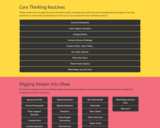
This amazing toolbox organizes Thinking Routines into categories.
When you open a routine, go to the section for Resource Links to access an explanation/lesson on how to use this tool.
Tools or strategies are divided into these categories (a few examples are listed but there are many more):
*Core thinking routines (E.g., See, think, wonder, What makes you say that?)
*Digging Deeper Into Ideas (E.g., Outside in, Layers, Fact or fiction?)
*Introducing and exploring ideas (Lenses, Step in - step out - step back)
*Objects and systems (Creative hunt, Parts-people-interactions)
*Perspective taking (Options explosion, True for who?)
*Perspectives, controversies and Dilemmas (Tug for truth, Sticking points, 4Cs)
*Possibilities and analogies (3-2-1 bridge, Creative quesitons)
*Synthesizing and Organizing Ideas (+1 Routine, Take note, Headlines)
*With Art or Objects (Creative comparisons, Looking: 10x2, Thinking with images)

Third-grade math instruction is focused on the following areas: developing an understanding of multiplication and division and strategies for multiplication and division within 100; developing an understanding of fractions, especially unit fractions (fractions with numerator 1); developing an understanding of the structure of rectangular arrays and of area; describing and analyzing two-dimensional shapes.
The best way to ensure your students fully grasp the math concepts they'll need to successfully progress in their education is to practice as much as possible. The worksheets, puzzles, games, and other resources available here are the perfect solution for parents and teachers who want to provide their third graders with the tools they need to understand and excel in third-grade math.